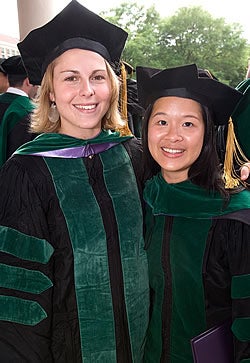Pair headed to Honduras to hone medical skills
When their classmates eagerly opened envelopes a few weeks ago to find out where they would be going for their medical residencies, Heang Lim and Jessica Weeks opened envelopes and read the simple words, “Have a nice day!”
That’s because the pair of medical graduates will be headed not into traditional residency programs but to Honduras to hone their medical skills providing care for people in the impoverished nation.

Jessica Weeks, left, and Heang Lim are headed to Honduras to deliver health care in the impoverished country. Photo by Cliff Hollis
They leave May 31 for Honduras. They will return to the United States in mid-August to renew their visas, then return to Honduras until Nov. 13, when their rotation ends.
After that, they will interview for residency positions in the United States, and possibly return to Honduras next year.
Honduras is in the heart of Central America. Its north coast borders the Caribbean Sea and its southern tip touches the Pacific Ocean. Its 7.5 million people have a per capita income of $3,300 a year, making Honduras one of the 10 poorest countries in the Western Hemisphere. Water quality is generally poor and proper treatment of wastewater scarce. Many rural people make do with latrines.
Weeks and Lim have worked in Honduras before. They spent two weeks there in September with the aid group Shoulder to Shoulder, with which they’ll be working this year. Seeing the lack of health care resources and the challenges the rural people face, they decided to postpone residency to spend six months working there.
“You might walk three hours to get to your doctors office, but when you get there, there’s no doctor there,” said Weeks, who’s from the mountain town of Burnsville. “You realize how much you take for granted, how much need there is and how much you can do.”
Dr. Harry Adams, a professor emeritus at Brody who still works half-time, has known Weeks and Lim since they were first-year medical students. The students went along on an annual trip Adams and Dr. John Rose arrange each year to Nicaragua, and he was impressed with their dedication to service and desire to work abroad. Before going to Nicaragua, the pair went to Spanish language school in Peru.
“They’ve been just excellent medical students,” Adams said.
He added that he thinks international medical rotations are important for aiding intercultural understanding, improving language skills, raising awareness of living conditions in other countries and improving clinical skills, since many countries lack modern diagnostic tools common in the United States.
“I think it really makes them better doctors by doing that,” Adams said.
Lim said residency match day, when her classmates were learning where they would be training, was just as much fun for her even though she was delaying her residency.
“I was genuinely excited for my other classmates while being excited for myself,” she said.
Showing appreciation for Weeks’ and Lim’s commitment, their classmates directed their class gift to the pair to help with expenses.
Weeks and Lim, who’s from Matthews, said they plan to continue working internationally and helping others in need. Both plan to purse residencies in internal medicine/pediatrics.
“We’re blessed to be in a profession where we have the skills to work anywhere in the world and ability to help anywhere in the world,” Weeks said.